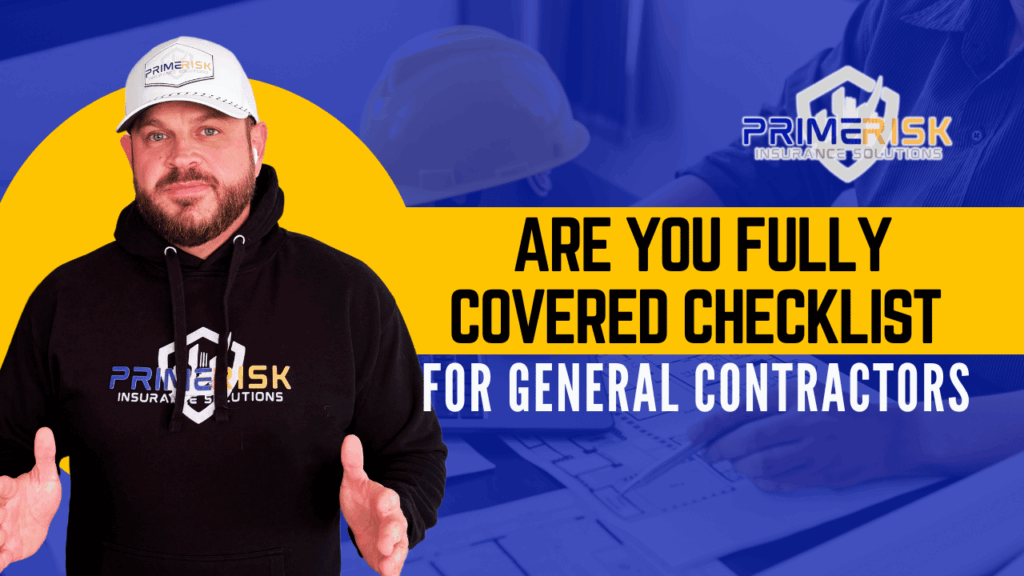
Why General Contractors in Arizona Need This Guide
If you’re a general contractor in Arizona, you’re operating in one of the fastest-growing construction markets in the country. Projects are everywhere—from residential remodels in Scottsdale to commercial builds in Phoenix and new developments in Tucson.
With this growth comes risk.
Many contractors mistakenly believe that once they’re licensed, they’re fully protected. Unfortunately, that’s not the case. Arizona’s licensing requirements are minimal when it comes to insurance. The Arizona Registrar of Contractors (ROC) mandates workers’ compensation if you have employees and a license bond, but general liability insurance is not required for licensing.
That leaves a lot of contractors dangerously underinsured.
Without the right coverage, a single accident could result in legal fees or claims that could wipe out your business—even if the claim has no merit. Lawsuits can cost tens of thousands of dollars in defense costs alone.
This guide will help you understand the specific insurance needs of Arizona contractors. You’ll learn:
- Which insurance coverages are required by Arizona law
- Which additional policies are critical to protecting your business and assets
- How to avoid the most common insurance mistakes contractors make
- How to create a comprehensive insurance portfolio that keeps you protected
By the end, you’ll have a step-by-step checklist you can use to confidently secure the coverage you need.
What Insurance Arizona Contractors Are Legally Required to Carry
Arizona’s contractor insurance laws are straightforward—but often misunderstood. Knowing the difference between what the law requires and what’s smart business is crucial.
Arizona Registrar of Contractors (ROC) Requirements
Here’s what the ROC actually requires for licensing:
- Workers’ Compensation Insurance: If you have employees, you must carry workers’ comp. This covers medical expenses and wage replacement for employees injured on the job.
- License Bond: All contractors must provide a license bond. This is not insurance but serves as a financial guarantee that you’ll operate according to state regulations.
What the ROC Does NOT Require
- General Liability Insurance: Despite popular belief, Arizona does not require general liability insurance to obtain or maintain a contractor’s license.
Why Smart Contractors Get More Coverage Than the State Requires
Just because something isn’t legally required doesn’t mean it isn’t necessary. Operating without proper insurance exposes you to:
- Financial Liability: Accidents, injuries, or property damage could leave you personally responsible for costs.
- Lost Opportunities: Most clients—especially commercial, government, and high-end residential—require proof of insurance before awarding a contract.
- Reputation Risk: Clients prefer working with insured contractors because it signals professionalism.
The 7 Insurance Policies Every Arizona Contractor Should Consider
Even though Arizona requires only workers’ compensation for licensing, successful contractors often carry a range of policies to cover the risks they face daily.
Here’s a breakdown of the essential insurance types for Arizona contractors:
1. General Liability Insurance
What It Covers:
- Bodily injury to third parties
- Property damage caused during work
- Personal and advertising injury (such as claims of defamation)
Why It Matters:
Without general liability coverage, a simple jobsite accident could bankrupt your business. Clients will usually require this before hiring you.
2. Workers’ Compensation Insurance
What It Covers:
- Medical bills for injured employees
- Lost wages during recovery
- Legal costs if an employee sues for a workplace injury
Why It’s Mandatory:
Arizona law requires all employers to carry workers’ comp. Penalties for non-compliance include fines, potential jail time, and personal liability.
3. Commercial Auto Insurance
What Commercial Auto Insurance Covers:
- Company vehicle accidents
- Property damage caused by your vehicles
- Medical expenses from auto-related accidents
- Tools and equipment in transit (with endorsements)
Why Contractors Need It:
Personal auto policies don’t cover work-related driving. If you’re transporting tools or employees, you need commercial coverage.
4. Inland Marine Insurance
What Inland Marine Insurance Covers:
- Tools, equipment, and materials while in transit or on job sites
- Theft, vandalism, and damage of movable property
Why It’s Critical:
Many contractors mistakenly assume general liability covers their tools—it doesn’t. Inland marine protects the very equipment you depend on.
5. Professional Liability Insurance
What Professional Liability Insurance Covers:
- Design errors
- Project management mistakes
- Consulting oversights that cause financial harm
Who Needs It:
If you offer design-build services, project consulting, or provide client recommendations beyond manual labor, this policy protects you from costly claims.
6. Umbrella Insurance
What It Covers:
- Additional coverage beyond your general liability, auto, and workers’ comp limits
- Large claims that exceed the limits of primary policies
Why It’s Valuable:
Umbrella insurance is a cost-effective way to increase your protection without dramatically raising premiums.
7. Builder’s Risk Insurance
What Builder’s Risk Insurance Covers:
- Structures under construction
- Theft, fire, weather damage, or vandalism during the build
Who Should Carry It:
Often, either the contractor or property owner can carry builder’s risk insurance. It’s usually determined by contract, but understanding the coverage is important for all parties.
How Much Insurance Coverage Do Arizona Contractors Really Need?
Contractors often ask, “How much insurance is enough?” The answer depends on your:
- Project size and type
- Revenue and payroll
- Employee count
- Risk tolerance
Industry Standard Coverage Amounts
Most contractors in Arizona carry:
- General Liability: $1 million per occurrence / $2 million aggregate
- Umbrella Coverage: $1 million or more
- Workers’ Compensation: Rates based on payroll and job classification
What Impacts Your Premiums?
Insurance costs are influenced by:
- Your contractor specialty (roofers pay more than painters)
- Business size and revenue
- Claims history
- Use of subcontractors
- Number of employees
- Geographic location within Arizona
8 Insurance Mistakes That Could Put Your Contracting Business at Risk
Even if you have insurance, making these mistakes can leave you exposed:
- Misclassifying Your Work: Listing yourself as a handyman when you’re doing roofing can lead to denied claims.
- Letting Coverage Lapse: Even a one-day lapse can leave you without protection when you need it most.
- Not Disclosing Subcontractor Use: Subcontractors without proper insurance can create liability for you.
- Underreporting Payroll: Leads to audit penalties and potential claim denials.
- Assuming Tools Are Covered by General Liability: Tools require inland marine coverage, not liability policies.
- Ignoring Contract Insurance Requirements: Failure to meet contractual obligations can void your coverage.
- Delaying Claims Reporting: Late reporting can lead to denied claims.
- Choosing the Cheapest Policy: Low-cost policies often come with hidden exclusions.
Arizona Contractor Insurance Checklist: A Step-by-Step Guide
Here’s how to secure the right insurance for your business:
Phase 1: Assess Your Business
- List all services you offer
- Identify risks for each service
- Document your tools, vehicles, and equipment
- Review use of subcontractors
Phase 2: Secure Required Coverage
- Workers’ Compensation (if you have employees)
- General Liability Insurance (recommended minimum: $1M/$2M limits)
Phase 3: Evaluate Additional Policies
- Commercial Auto
- Inland Marine
- Professional Liability
- Umbrella Insurance
- Builder’s Risk (if applicable)
Phase 4: Shop and Compare Providers
- Get quotes from at least three providers
- Use an agent who specializes in contractor insurance
- Check company financial strength and claims reputation
Phase 5: Manage and Maintain Your Coverage
- Track renewal dates
- Collect certificates of insurance from subcontractors
- Review policies annually
- Update your agent on business changes
How to Select the Right Insurance Provider for Your Contracting Business
When choosing an insurance partner, look for:
- Experience with contractor insurance
- Knowledge of Arizona’s regulations
- Strong claims service reputation
- Financial stability (check A.M. Best ratings)
- Willingness to explain policy details in plain language
Avoid agents or companies that focus solely on price or rush you into a decision without reviewing your needs.
How to Maintain and Review Your Contractor Insurance Year After Year
Proper insurance management is ongoing. Here’s how to keep your coverage effective:
- Review policies annually with your agent
- Notify your provider of business changes (new services, more employees, etc.)
- Keep subcontractor insurance certificates up to date
- Track claims history and implement safety improvements to reduce risk
Protect Your Contracting Business: What to Do Now
Arizona’s construction market is full of opportunity, but success depends on protecting your business from risks you can’t always control. Operating without the right insurance could jeopardize everything you’ve built.
Here’s what to do next:
- Review your current coverage
- Use this checklist to identify gaps
- Connect with a contractor insurance specialist in Arizona
- Get multiple quotes to ensure you’re getting the best combination of value and protection
Your business, your team, and your financial future are worth protecting. Taking these steps now will ensure you’re covered—so you can focus on growing your business with confidence.

